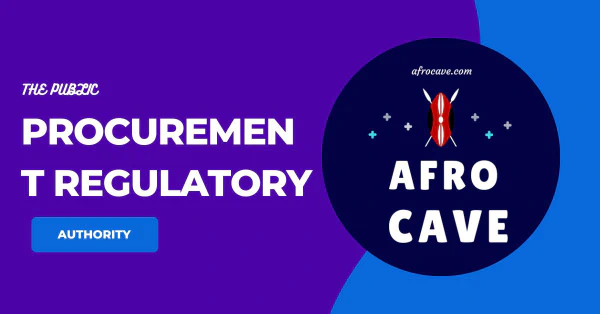Functions of Public Procurement Regulatory Authority in Kenya
- Author Gĩthĩnji
- Updated on:

The function of the Public Procurement Regulatory Authority is to monitor, assess and review the public procurement and asset disposal system to ensure they respect the national values and other provisions, including Article 227 of the Constitution on public procurement, among other functions.
Section 8 of the Public Procurement and Asset Disposal Act establishes the Public Procurement Regulatory Authority as a body corporate with perpetual succession and a common seal. The Authority shall, in its corporate name, be capable of the following–
- suing and being sued;
- acquiring, safeguarding, holding, charging and disposing of moveable and immovable property; and
- doing or performing all such other things or acts to discharge its functions properly under the Public Procurement and Asset Disposal Act, which a body corporate may do by law.
The Authority may establish such offices in regional locations as it may deem necessary for its operations to ensure access to its services under Article 6 of the Constitution.
Table of ContentsShow/Hide
management of the Public Procurement Regulatory Authority
The management of the Authority shall vest in the Public Procurement Regulatory Board, which shall consist of the following–
- a chairperson nominated by the Cabinet Secretary for the time being responsible for matters relating to finance and appointed by the President;
- two members who the Cabinet Secretary shall appoint after nomination through a fair process by the–
- Institute of Certified Public Accountants of Kenya, and
- the Kenya Institute of Supplies Management;
- the Cabinet Secretary or their representative;
- the Attorney-General or their representative; and
- four other persons appointed by the Cabinet Secretary.
In the appointment of the chairperson and members, the appointing body shall ensure regional and gender balance.
Functions of Public Procurement Regulatory Authority
The functions of the Public Procurement Regulatory Authority in Kenya shall be to–
- monitor, assess and review the public procurement and asset disposal system to ensure that they respect the national values and other provisions of the Kenyan Constitution, including Article 227 and make recommendations for improvements;
- monitor the public procurement system and report on its overall functioning and present to the Cabinet Secretary and the county executive member for finance in each county, such other reports and recommendations for improvements;
- enforce any standards developed under the Public Procurement and Disposal Act;
- monitor classified procurement information, including that of specific items of security organs and make recommendations to the Cabinet Secretary;
- monitor the implementation of the preference and reservation schemes by procuring entities;
- prepare, issue and publicise standard public procurement and asset disposal documents and formats to be used by public entities and other stakeholders;
- provide advice and technical support upon request;
- investigate and act on complaints received on procurement and asset disposal proceedings from procuring entities, tenderers, contractors or the general public that are not subject of administrative review;
- research on the public procurement and asset disposal system and any developments arising from the same;
- advise the Cabinet Secretary on the setting of standards, including international public procurement and asset disposal standards;
- develop and manage the State portal on procurement and asset disposal and ensure that it is available and easily accessible;
- monitor and evaluate the preference and reservations provided for under the Public Procurement and Disposal Act and provide quarterly public reports;
- create a central repository or database that includes–
- complaints made on procuring entities;
- a record of those prohibited from participating in tenders or those debarred;
- market prices of goods, services and works;
- benchmarked prices;
- State organs and public entities that are non-compliant with procurement laws;
- statistics related to public procurement and asset disposal;
- price comparisons for goods, services and works; and
- any information related to procurement that may be necessary for the public;
- Inform the Cabinet Secretary, Parliament, the relevant County Executive Committee member for finance, the relevant County Assembly, or the Auditor-General, as appropriate, of issues of non-compliance with procurement laws when the applicable State organ or public entity disregards the Public Procurement Regulatory Authority’s written directives, including material breaches of the measures established under the Public Procurement and Disposal Act;
- generally report to Parliament and the relevant county assembly;
- develop a code of ethics to guide procuring entities and winning bidders when undertaking public procurement and disposal with State organs and public entities;
- in undertaking its functions, cooperate with state and non-state actors to obtain recommendations on how to improve public procurement and disposal;
- ensure the procurement entities implement the preference and reservations and provide data to the Public Procurement Regulatory Authority disaggregated to indicate the number of disadvantaged groups that have benefitted;
- perform such other functions and duties in the Public Procurement and Disposal Act and any other relevant law.
For more information about the Public Procurement Regulatory Authority, see the Public Procurement and Disposal Act and visit their website.
- «Previous Role of the Community Forest Associations in Kenya
- Next» Role of Agriculture and Food Authority in Kenya


